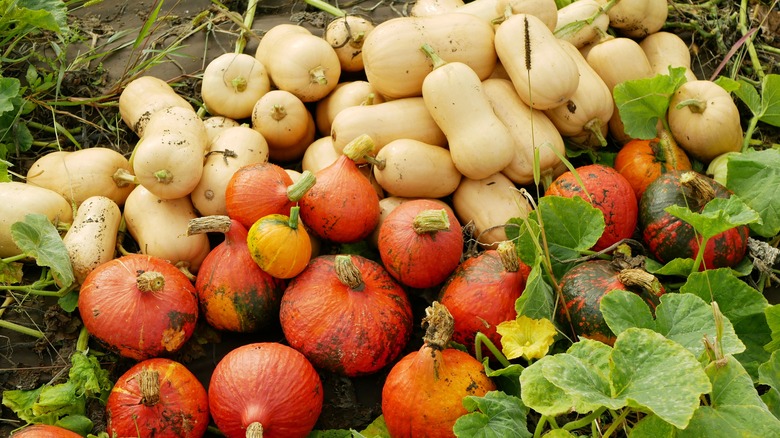The Unexpected Secret To Longer-Lasting Squash
Squash is a versatile treat. It's a rich and nutty addition to pastas, a creamy ingredient for casseroles, a perfect side dish roasted in the oven. Thick-skinned winter squash also stores pretty well, lasting for three months if you leave it whole and store it carefully. But all too often, little spots of mold will start to appear on the squash skin and wreak havoc. The mold spots will begin to grow, then suddenly your squash will descend into spoilage.
Luckily, it won't take much to stave off the mold spots before you even begin storage. If the skin of your squash is particularly shiny, it might already have been treated with food-grade wax, which is used to make the fruit last longer and prevent these spots on its own. However, if you grow your own or you purchased yours from a market, and you're looking for the absolute best way to store squash, it's easy to treat the squash's skin with just a little bit of vegetable oil to achieve the same preservation.
Give it a good oil coating
The method itself is simple, and all you'll need is a neutral oil, like vegetable oil, and a paper towel or cloth. You'll want to start by cleaning any dirt off the outside of the unpeeled winter squash with some water — then dry it. Be sure to dry the squash completely because any moisture you leave behind can lead to mold (exactly what you're trying to prevent). Once it's dry, put a little bit of oil onto the paper towel or cloth and rub it on the skin, not overlooking the squash's nooks and crannies. There shouldn't be an excess of oil when you're done, just a very light coating, so just wipe some off if you added too much.
After the oil coating, you should store your squash in a cool place, like a pantry or closet, that stays at around 50 degrees. If you're keeping more than one squash, it's best not to let them touch in storage because blemishes on one squash can impact the others. They should also be kept away from fruits, like apples, that emit ethylene gas as they ripen and spoil. Check on the squash every once in a while during storage to make sure that bruises don't appear — turning them occasionally can help. It's also useful to store them in something that will give air circulation, like a wire basket or wire drawer.
But what if it's already been cut?
The oil trick will help whole, unpeeled winter squash stay fresh, but cut squash is a different matter. Normally, cut squash (either raw or cooked) will keep fresh in an airtight container in the refrigerator for about three to five days. That isn't very long to enjoy squash's nutty flavor and the dishes that can come from it, so this method is best kept for the times when you have a particular plan for the squash.
If you want the squash to last even longer, the freezer will be your best friend. Squash can be frozen in cubes — to keep the cubes from sticking together, you can freeze them on a baking sheet first, then put the frozen cubes in a more compact container for longer-term storage. You can also cook and puree the squash, let the puree cool down, then freeze it for as much as six months. The frozen butternut squash can be roasted for a crispy finish, or the puree can be used to give a hearty flavor to butternut squash soup, stews, and casseroles throughout the year.


